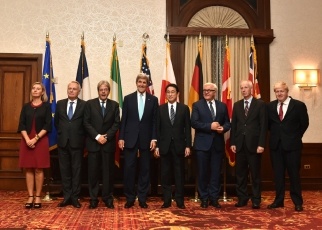G7/G8
G7 Foreign Ministers’ Meeting
September 20, 2016

On Tuesday, September 20, commencing at 8:20 p.m. (9:20 a.m., Wednesday, September 21, Japan time) for approximately an hour and a half, Mr. Fumio Kishida, Minister for Foreign Affairs, who is visiting New York to attend the United Nations General Assembly (UNGA), held a G7 Foreign Ministers' Meeting as the Chair. The overview of the meeting is as follows. (The meeting was attended by the foreign ministers of the G7 countries and the High Representative of the European Union (EU) for Foreign Affairs and Security Policy).
After the meeting ended, the "G7 Foreign Ministers' Statement on Recent Developments in Asia (PDF) " and the "G7 Foreign Ministers' Statement on Countering Terrorism and Violent Extremism (PDF)
" and the "G7 Foreign Ministers' Statement on Countering Terrorism and Violent Extremism (PDF) " were issued.
" were issued.
After the meeting ended, the "G7 Foreign Ministers' Statement on Recent Developments in Asia (PDF)
 " and the "G7 Foreign Ministers' Statement on Countering Terrorism and Violent Extremism (PDF)
" and the "G7 Foreign Ministers' Statement on Countering Terrorism and Violent Extremism (PDF) " were issued.
" were issued.1 Developments in Asia
(1) At the beginning, Minister Kishida explained the security environment in Asia, which has grown even more severe following the G7 Hiroshima Foreign Ministers' Meeting.
(2) With regard to North Korea, the foreign ministers shared the view that the recent nuclear test and increasing number of ballistic missile launches pose an unprecedented level of threat, and based on that, the G7 will coordinate to increase pressure through measures such as adopting a UN Security Council (UNSC) resolution that includes new sanctions. Furthermore, Minister Kishida called for understanding and cooperation for immediately resolving North Korea's human rights and humanitarian issues, including the abductions issue, and the participating ministers concurred with him.
(3) In addition, the foreign ministers remained concerned about the situation in the East China Sea and South China Sea, and along with reconfirming the G7's position of emphasizing the rule of law, they shared the view that the G7 will continue to present a united voice aimed at achieving the rule of law. The foreign ministers shared recognition that the award in the arbitration between the Republic of the Philippines and the People's Republic of China provides a useful basis for further efforts to peacefully resolve disputes in the South China Sea.
(2) With regard to North Korea, the foreign ministers shared the view that the recent nuclear test and increasing number of ballistic missile launches pose an unprecedented level of threat, and based on that, the G7 will coordinate to increase pressure through measures such as adopting a UN Security Council (UNSC) resolution that includes new sanctions. Furthermore, Minister Kishida called for understanding and cooperation for immediately resolving North Korea's human rights and humanitarian issues, including the abductions issue, and the participating ministers concurred with him.
(3) In addition, the foreign ministers remained concerned about the situation in the East China Sea and South China Sea, and along with reconfirming the G7's position of emphasizing the rule of law, they shared the view that the G7 will continue to present a united voice aimed at achieving the rule of law. The foreign ministers shared recognition that the award in the arbitration between the Republic of the Philippines and the People's Republic of China provides a useful basis for further efforts to peacefully resolve disputes in the South China Sea.
2 Countering terrorism and violent extremism
(1) Based on the discussions at the G7 Hiroshima Foreign Ministers' Meeting and the G7 Action Plan on Countering Terrorism and Violent Extremism that was adopted at the G7 Ise-Shima Summit, the foreign ministers reaffirmed the unity of the G7, and confirmed that they will make steady efforts based on the action plan issued at the Ise-Shima Summit.
(2) Furthermore, in connection with this, the foreign ministers discussed the situation in Syria and shared the view that there is a pressing need for the international community to support the September 9 agreement between the United States and Russia on the cessation of hostilities in Syria, and make efforts to ensure that the parties on the ground accept the agreement.
(2) Furthermore, in connection with this, the foreign ministers discussed the situation in Syria and shared the view that there is a pressing need for the international community to support the September 9 agreement between the United States and Russia on the cessation of hostilities in Syria, and make efforts to ensure that the parties on the ground accept the agreement.
3 Other
Lastly, the foreign ministers agreed to issue the "G7 Foreign Ministers' Statement on Recent Developments in Asia" and the "G7 Foreign Ministers' Statement on Countering Terrorism and Violent Extremism" as the consensus of the G7, based on the content of their discussions.

